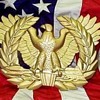Posted 12 years ago
 dlfd911
dlfd911
(134 items)
This was passed down to me from my father, who got it from my uncle. I have no idea of the age of it, although it appears to be quite old. The blade has a triangular cross section, and is hand wrought iron. The edges of the blade are not quite straight. The blade is 13 inches long, the entire bayonet measures 16 1/4 inches. The inside diameter of the socket is exactly one inch. There are no markings on it anywhere. Any information you can offer would be welcome.













Being hand forged, this could very well be Confederate. The much earlier style of the socket without a locking ring also tends to support this theory.
Wow, thanks for the information Blunderbuss, that's fascinating.
Disagree completely with any Confederate attribution.
Socket diameter (1") would be indicative of a very large caliber musket-- the US .69 caliber bayonet socket is usually about .845".
Crude manufacture would also be indicative of an early piece.
Early/ large caliber would lead me to a late 18th century bayonet similar to what was used for a Brown Bess or Colonial era weapon.
scott
I agree that we are speculating Scott & I don't have specs. for O.D. of all the arms that could qualify. I sold an 1809 Eli Whitney a few yrs ago that was .69 cal and doubt that the muzzle (very good condition) had a wall thickness of 1/8". Then, the Whitney "Plymouth" .69 had a much thicker wall thickness. The Confederates turned the muzzles of octagon barrel rifles so they could use a bayonet. The I.D. of the socket here is indeed odd & leads to endless speculation. The fact that it is "hand made of wrought iron" could also indicate Revolutionary or even from another country. The socket of of the Brown Bess style but obviously not for one.
We can speculate all we want & without proof, we get nowhere. My speculation is for it being made for a turned oct. barrel, most likely Confederate but possibly Revolutionary or foreign for maybe a .75 cal. as they were used here & abroad. (I'm using 'here' as if I live there).
I tend to shy away from Confederate attributions in general, unless there is stronger evidence than this. Many US bayonets were blacksmith made during and in the years following the American Revolution, and the socket inside diameter seems more appropriate to .75 caliber musket, which make me think this is older the American Civil War. Based on this slim evidence, my best guess is US, late 18th century.
Of course it’s possible that this is confederate. If we are only speculating, I could also speculate it was hammered out somewhere in India or Afghanistan for some obsolete musket. I'm just tossing that out to get us out of the "American" mind frame, but looking at the socket mouth and blade shoulders, my bet is that it was produced somewhere on earth that British boots once trod.
I tend to got with the "most likely" identification.
The Bayonet is typical of 18th century construction:
http://worldbayonets.com/Bayonet_Identification_Guide/United_States__19th_Century_/us_19th_century_2.html
scott
I wish I knew where or how my uncle bought it. Because he brought some souvenirs home from his time in the service, it might have gotten him interested in buying more and creating a collection. He lived in Maine, near the coast, and never traveled too far from home, so it is quite possible that he found it in someone's attic or basement, or in an antique store, but most likely in Maine or New Hampshire. My father gave it to me about 20 years ago, and they are both gone now, so there's nobody to ask about its origin.
The brown bess was .75 so maybe homemade for one. The upper N.E. fits with that as the conflicts were between Brits. & Fr.. Settlers wouldn't have much use for a bayonet except as a candle holder.
Close enough for me. So probably dates from near the American Revolution, and likely a local blacksmith-made piece. Thank you everyone for your comments. I knew I could get some direction on CW.